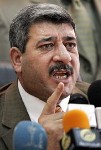 Almotamar.net Google Alerts
Almotamar.net Google Alerts - A deputy premier's brother and six guards are among nine killed, apparently by insurgents targeting 'collaborators'
BAGHDAD � Bombings wounded one of Iraq's two deputy prime ministers in his prayer room Friday and killed nine people, the latest attack on Sunni Arabs perceived as collaborators because of their involvement with the country's U.S.-backed government.
Salam Zikam Ali Zubaie, a member of the largest Sunni bloc in parliament, was injured when a suicide bomber detonated an explosives belt in a small mosque at the politician's home during early-afternoon prayers. A car bomb went off outside at the same time.
Zubaie's brother and six of his bodyguards were among the nine killed; 14 people were wounded.
In an interview on Al Iraqiya news, Brig. Gen. Qassim Musawi said the attack appeared to have come from within the official's own security detail. "There was a clear security violation within the guards of the deputy prime minister," he said.
Zubaie escaped an attack in December, when gunmen struck his convoy south of Baghdad, injuring one of his bodyguards.
Two siblings of Tariq Hashimi, one of the nation's two vice presidents, were killed in attacks last year. Hashimi, a Sunni, has repeatedly called for the United States to maintain its presence in Iraq in the hope of restoring peace. And last fall, the Sunni speaker of parliament, Mahmoud Mashadani, narrowly survived a car bomb attack on his convoy.
"This is part of the, if you like to call it, Sunni-Sunni conflict," said Wamidh Nadhmi, a political science professor at Baghdad University. "On the one hand, you find the [Sunni] party is getting more and more involved in the political procedure and the political operation, and the resistance is finding itself very much apart from that."
The U.S. military announced that two American troops died Thursday. A Marine died in combat in Al Anbar province, and a soldier was killed in west Baghdad by a roadside bomb during a clearing operation.
In Baghdad, a car bomb exploded in a used car lot in the city's north, killing five people and wounding 19, and police discovered the bodies of 28 men shot to death.
Zubaie was taken to a hospital staffed by U.S. military medical personnel in Baghdad's heavily fortified Green Zone, not far from his compound. The extent of his injuries was unclear; supporters said his wounds were superficial, but others who visited him said they were more serious. Alaa Makki, a member of Zubaie's Tawafiq bloc, who had spoken to a doctor, said he was still under anesthesia Friday night but was expected to recover and return to his job.
Prime Minister Nouri Maliki visited Zubaie in the hospital Friday afternoon and spoke with him, but an aide to Maliki declined to reveal details of the conversation. A statement from his office said Zubaie's condition was stable and he did not need to be transferred overseas for more intensive care.
Zubaie was an agriculture professor at Baghdad University who became involved in Iraq's politics through his academic work. Salim Abdullah Jabouri, also a member of the Sunni bloc, said Zubaie developed a reputation for integrity and became popular within the group, which led them to nominate him to serve in the deputy prime minister's slot.
Some Tawafiq members once were part of the insurgency opposing the U.S. presence in Iraq, but the bloc decidAed in late 2005 to Aparticipate in the political process.
That, members say, has opened them up to attacks from former confederates who now view them as traitors.
"From the beginning, we were against terrorism, but we recognized a national resistance in Iraq and understood their motivation, and decided to give them a chance to be part of the political process through being part of reconciliation," said Iyad Samarrai, the general secretary of the Iraqi Islamic Party, part of the Tawafiq bloc. Now, he said, members are being targeted by Al Qaeda in Iraq and other militant groups.

